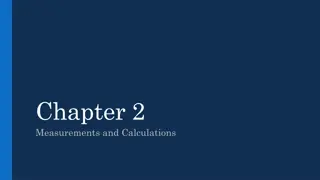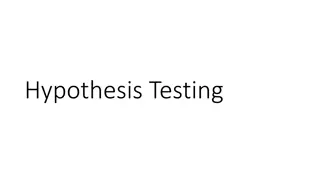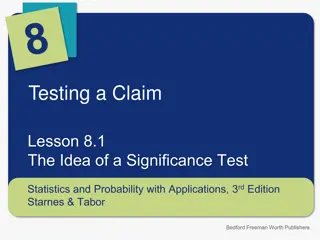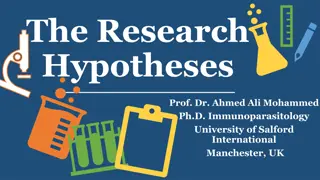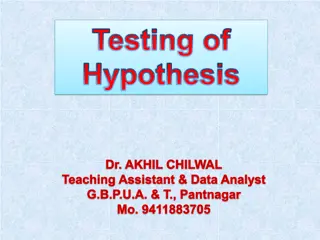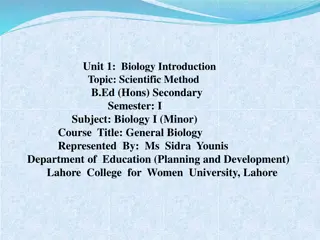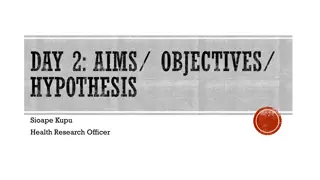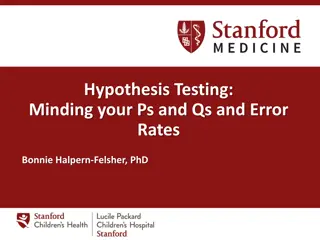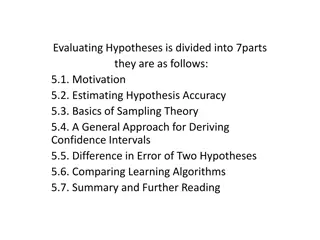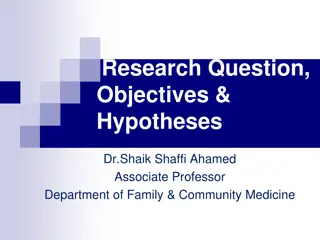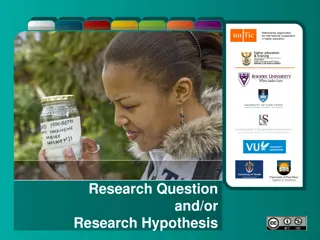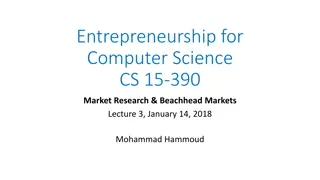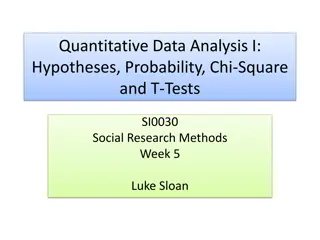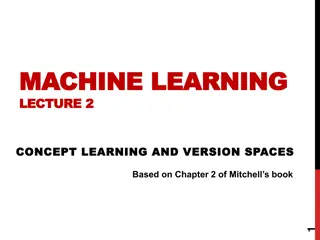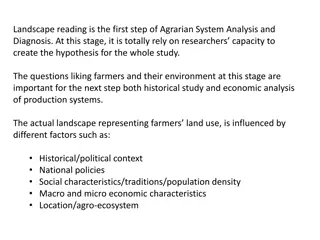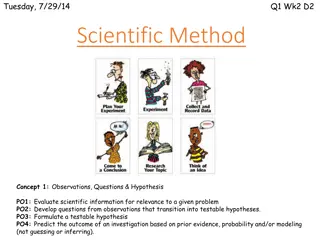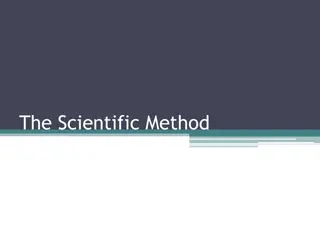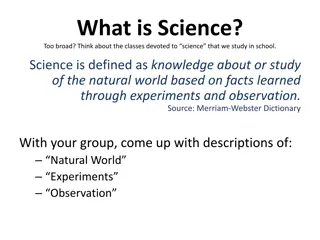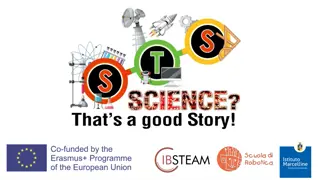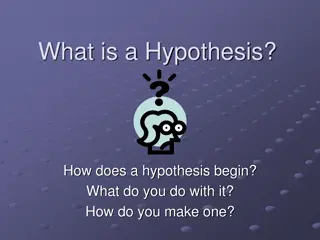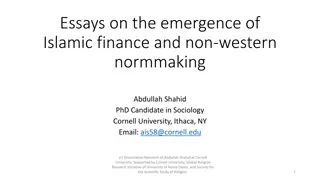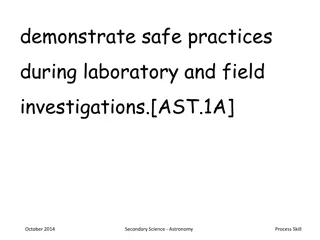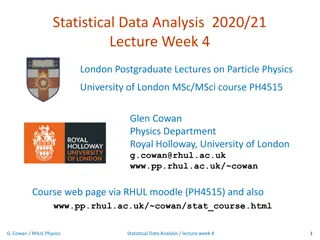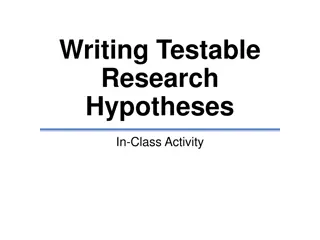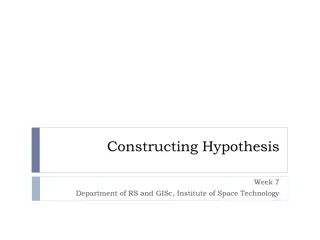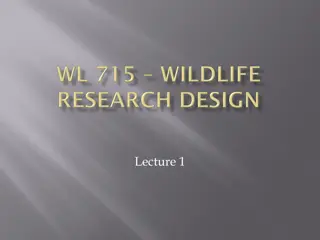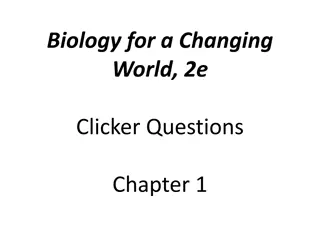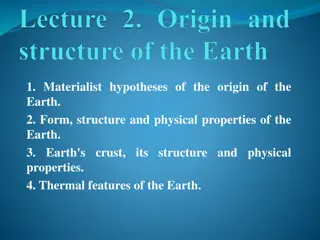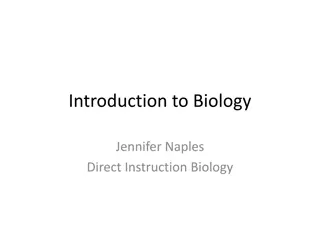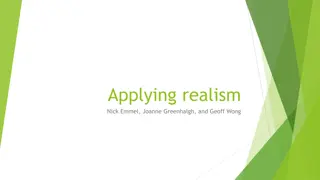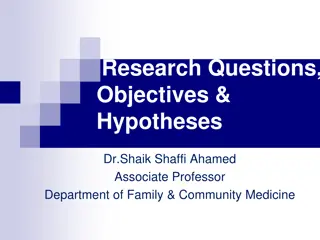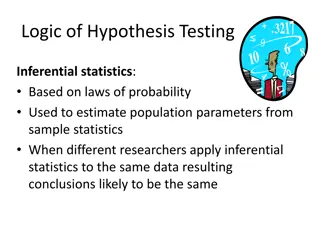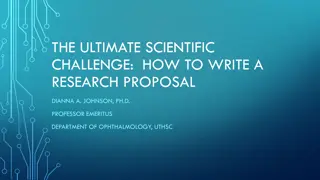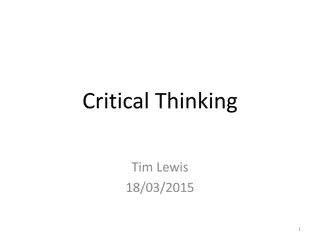Inferential Statistics
Hypothesis testing is a key aspect of inferential statistics, allowing researchers to make conclusions about populations based on sample data. This process involves formulating hypotheses, conducting experiments, and determining the probability of results under different scenarios. By comparing the
0 views • 28 slides
Understanding the Scientific Method in Measurements and Calculations
Explore the scientific method in detail, including observing, collecting data, formulating hypotheses, testing hypotheses, and formulating theories with practical examples. Understand the importance of experimentation and how it leads to the development of scientific theories. Engage in activities t
6 views • 43 slides
Understanding Hypothesis Testing and Null vs. Alternative Hypotheses
A hypothesis is a prediction about a study's outcome, guiding research direction. Stating hypotheses forces deep thinking and making specific predictions but may introduce bias. Null hypothesis (H0) states no effect, while alternative hypothesis (Ha) claims an effect in the population. Researchers e
0 views • 7 slides
Understanding Significance Testing in Statistics
Significance testing is a vital concept in statistics used to analyze data and make informed conclusions about population parameters. This lesson delves into the significance test procedure, hypotheses formulation, interpreting P-values, and drawing appropriate conclusions based on statistical evide
2 views • 9 slides
Importance of Testable Hypotheses in Scientific Research
Hypotheses play a crucial role in scientific research as they provide a clear statement that can be tested. A genuine research hypothesis must be specific, testable, and falsifiable. It guides researchers in planning studies and helps in determining the outcomes. A good research hypothesis is clear,
0 views • 14 slides
Understanding Hypothesis Testing in Statistical Analysis
Statistical analysis aims to make inferences about populations based on sample data. Hypothesis testing is a crucial aspect where decisions are made regarding accepting or rejecting specific values or parameters. Statistical and parametric hypotheses, null hypotheses, and decision problems are key c
1 views • 34 slides
Understanding the Scientific Method in Biology
The scientific method is a systematic approach used in biology to investigate and solve problems. It involves observations, forming questions, creating testable hypotheses, conducting experiments, analyzing data, drawing conclusions, and publishing results. Through this method, researchers can gathe
0 views • 14 slides
Understanding Research Aims, Objectives, and Hypothesis in Health Research
This content delves into the importance of defining research aims, objectives, and hypotheses in health research. It explains how research aims clarify the study's goals, objectives outline specific tasks to achieve those goals, and hypotheses help in making predictions. It also discusses the proces
1 views • 17 slides
Understanding Hypothesis Testing in Statistics
Hypothesis testing is essential in scientific inquiry, involving the formulation of null and alternative hypotheses at a chosen level of significance. Statistical hypotheses focus on population characteristics and are tested on samples using probability concepts. The null hypothesis assumes no effec
0 views • 26 slides
Understanding Hypothesis Evaluation in Machine Learning
Evaluating hypotheses in machine learning is crucial for assessing accuracy and making informed decisions. This process involves estimating hypothesis accuracy, sampling theory basics, deriving confidence intervals, comparing learning algorithms, and more. Motivated by questions about accuracy estim
0 views • 26 slides
Research Questions, Objectives, and Hypotheses in Diabetes Management
Explore the formulation of research questions, setting study objectives, and defining hypotheses in the context of diabetes mellitus management. Delve into the prevalence of diabetes in Saudi Arabia, glycemic control in diabetic patients, and addressing key research questions to reduce the impact of
0 views • 43 slides
Effective Guidance on Research Questions and Hypothesis Development
Understanding the importance of formulating clear research questions or hypotheses is crucial for the success of a study. Research questions guide the research process, while hypotheses propose explanations to be proven. This content emphasizes the significance of correctly developing research quest
0 views • 14 slides
Understanding Market Research and Beachhead Markets in Entrepreneurship
The session delved into the importance of market research, outlining primary and secondary types as well as qualitative and quantitative approaches. It emphasized the need for direct interaction with potential customers and exploring new hypotheses through qualitative research. The significance of g
3 views • 22 slides
Understanding Hypotheses, Probability, and Statistical Tests in Social Research
This content delves into formulating hypotheses in social science, selecting statistical tests based on variables' measurement levels, understanding probability in statistical analysis, and distinguishing between null and alternative hypotheses. It emphasizes the research process involving hypothesi
5 views • 21 slides
Understanding Concept Learning and Version Spaces in Machine Learning
In the field of machine learning, concept learning involves inferring general definitions of concepts from labeled examples. This process aims to approximate the best concept description from a set of possible hypotheses. The concept learning approach is illustrated through examples, such as predict
0 views • 18 slides
Understanding Landscape in Agrarian System Analysis
Landscape reading is the initial step in Agrarian System Analysis where researchers form hypotheses based on farmers' interactions with their environment. Factors like historical context, policies, and socio-economic conditions influence farmers' land use. Zoning the landscape helps explain agricult
1 views • 4 slides
Understanding the Scientific Method: Observations, Questions, and Hypotheses
Explore the scientific method concept of making observations, asking questions, and forming hypotheses. Learn the difference between causal and descriptive questions and practice applying them. Understand how to approach a situation like a non-starting washing machine through causal and descriptive
0 views • 28 slides
Understanding the Scientific Method and Examples
The scientific method is a systematic approach to answering questions and solving problems. It involves steps like observation, asking questions, forming hypotheses, collecting data, organizing data, and drawing conclusions. This method helps researchers find answers efficiently and allows others to
0 views • 9 slides
Understanding Science: Experiments, Observations, and Hypotheses
Knowledge about the natural world is gained through experiments and observation in science classes. Asking testable questions leads to formulating hypotheses, which offer possible explanations for phenomena observed. Investigating questions with scientific procedures, such as tracking Daphnia heart
0 views • 21 slides
Understanding the Essence of Science
Science is the systematic use of evidence to construct testable explanations and predictions of natural phenomena. It involves observation, forming theories and hypotheses, analyzing data, and conducting experiments to validate or falsify ideas. Science thrives on the principle that a single experim
0 views • 10 slides
Understanding the Hypothesis in Scientific Research
A hypothesis in scientific research is a proposed explanation for a phenomenon based on observations and existing knowledge. Scientists use hypotheses to formulate testable predictions and guide their investigations. This process is a fundamental step in the scientific method, involving asking quest
0 views • 17 slides
Emergence of Islamic Finance: Dynamics and Hypotheses
Exploring the emergence of Islamic finance and non-western norm-making through the research of Abdullah Shahid, a PhD candidate at Cornell University. The study delves into the dynamics of Islamic development financing, the context of the Islamic Development Bank, and various hypotheses related to f
0 views • 17 slides
Best Practices in Laboratory and Field Investigations for Secondary Science - Astronomy
This content covers various aspects of safe practices in laboratory and field investigations related to secondary science - Astronomy. It includes information on resource conservation, disposal/recycling of materials, understanding the limitations of science, scientific hypotheses, theories, disting
0 views • 16 slides
Computational Learning Theory: An Overview
Computational Learning Theory explores inductive learning algorithms that generate hypotheses from training sets, emphasizing the uncertainty of generalization. The theory introduces probabilities to measure correctness and certainty, addressing challenges in learning hidden concepts. Through exampl
0 views • 43 slides
Understanding Hypotheses and Tests in Statistical Data Analysis
This material covers essential topics on hypotheses and tests in statistical data analysis, including defining hypotheses, critical regions, simple vs. composite hypotheses, and the goal of tests. It emphasizes the importance of critical regions in determining the validity of hypotheses and explores
0 views • 48 slides
Understanding Hypothesis Testing in Statistics
Hypothesis testing is a fundamental concept in statistics that involves testing statements about population parameters. This content covers the basics of hypothesis testing, including types of hypotheses, examples, and the procedure involved in statistical hypothesis testing. It also explores the im
0 views • 23 slides
Understanding Hypothesis Testing in Statistics
This content discusses the fundamentals of hypothesis testing based on a single sample in statistics. It covers the assumptions for inference, the parts of a hypothesis test, statistical hypotheses, and provides examples of hypothesis tests and significance tests in practical scenarios. The importan
0 views • 69 slides
Managerial Decision Making and Systems View Process
Managerial decision making involves choosing between rational alternatives within a structured process, which includes defining the problem, collecting data, developing hypotheses, testing hypotheses, analyzing results, and drawing conclusions. The systems view approach encompasses all significant v
0 views • 27 slides
Crafting Research Hypotheses in Classroom Activity
This in-class activity focuses on understanding the structure of writing testable research hypotheses for both experimental and correlational studies. It involves selecting variables, operational definitions, and applying them in an experimental approach while practicing directional and non-directio
0 views • 15 slides
Understanding Hypotheses in Research: Importance and Development
Hypotheses play a crucial role in research by providing direction, clarity, and focus to a study. They are educated guesses that guide researchers in testing theories and making predictions about the relationship between variables. Developing a hypothesis involves common-sense reasoning, research mo
0 views • 22 slides
Understanding the Scientific Method: Key Concepts and Steps
Exploring the essence of science through definitions, types of science, and the scientific method. Emphasizes the importance of asking well-defined questions, developing testable hypotheses, setting up reproducible experiments, and making predictions based on established knowledge. An insightful jou
0 views • 27 slides
Understanding Experimental Design in Biology
Explore key concepts in experimental design in biology through clicker questions focusing on hypotheses, variables, control groups, and experimental groups. Learn how scientists test hypotheses and analyze results to draw valid conclusions in biological studies.
0 views • 15 slides
Hypotheses on the Origin of Earth and Earth's Formation
Various materialist hypotheses proposed by scientists such as Kant, Laplace, Schmidt, and Fesenkov regarding the origin of Earth and the solar system. These hypotheses suggest different processes, including the formation from primary dusty matter, hot nebula, interstellar meteorite dust, and gas-dus
0 views • 16 slides
Introduction to Biology: Exploring the Scientific Method
Explore the fundamentals of biology with Jennifer Naples through a direct instruction approach. Learn what biology is, dive into the scientific method, and understand how to formulate testable questions, gather information, create hypotheses, design experiments, and analyze results. Discover the ste
0 views • 32 slides
Unveiling Realist Methodology in Social Research
Uncover the essence of applied realist methodology through features like theory incarnate, context-dependent explanations, and transferable mechanisms. Explore the logic of analysis using the CMO configuration as a heuristic tool for social explanation, emphasizing the importance of context, mechani
0 views • 6 slides
Formulation of Research Questions, Objectives, and Hypotheses in Epidemiological Studies
Explore the importance of defining research questions, objectives, and hypotheses in epidemiological research, illustrated through examples from studies on diabetes mellitus in Saudi Arabia. Understand the steps involved in crafting clear objectives and hypotheses to address public health challenges
0 views • 37 slides
Understanding the Scientific Method in Biology
This content covers various aspects of the scientific method in biology, including testable statements, recorded observations, reasoning methods, and a practical application in a study on snake mimicry. It also discusses lab report expectations and compares theories to hypotheses.
0 views • 10 slides
Understanding Inferential Statistics and Hypothesis Testing in Research
Inferential statistics in research involve estimating population parameters from sample statistics and making decisions based on probability. Researchers follow a set process, starting with preparing for a study, defining variables, stating hypotheses, selecting appropriate tests, analyzing data, an
0 views • 30 slides
Mastering the Art of Writing a Research Proposal
Science is about exploring new ideas and creating testable hypotheses that contribute to scientific knowledge. Attributes of great ideas and thinkers are discussed. Developing your own unique idea is key to shaping your scientific career, fostering creativity, rigorous experimental testing, and inte
0 views • 18 slides
Understanding Critical Thinking, Hypotheses, and Arguments
Explore the concepts of critical thinking, hypotheses, and arguments in this informative content. Learn about the definition of hypotheses, the nature of arguments, and syllogisms. Delve into the world of logical reasoning and the foundations of thought processes.
0 views • 32 slides

